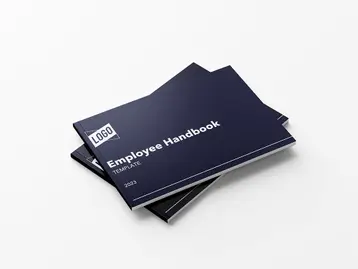
Independent contractors are becoming the future of work for many across the globe. In the United States alone, freelancers will likely make up 50% of the workforce by 2027. And there are several reasons why. Workers love the flexibility, autonomy, and potentially better pay that independent contracting provides. In addition, organizations enjoy the cost-savings of hiring a professional without needing to budget for benefits, business expenses, or workers' compensation. It's often a win-win.
Freelancers aren't employees, and therefore need their independent contractor policy.
But for HR professionals and small businesses who are used to W-2 employees, creating a policy for freelancers can be daunting. After all, an independent contractor is not an employee. And failure to correctly classify workers in the eyes of the IRS can result in hefty penalties. An independent contractor policy can help employers navigate the differences between employees and contractors and avoid potential compliance misfires.
The differences between independent contractors and employees
Before creating an independent contractor policy, it is essential to distinguish the differences between an employee and an independent contractor.
Independent contractors withhold their own taxes
Employees get a W-2 tax form and are responsible for how they choose to file their taxes, while independent contractors are responsible for withholding their own taxes via a 1099 form. Therefore, providing a W-9 form rather than a 1099 is indicative that the worker is not a full-time or temporary employee but a contractor.
Freelancers don't get all the benefits
Independent contractors are also not eligible for certain things that employees are, such as health benefits and employee bonuses. Another thing to keep in mind when creating your independent contractor policy is that independent contractors often aren't obligated to comply with the same company policies as employees and have different guidelines for termination.
Independent contractors often aren't obligated to comply with the same company policies.
Should you hire full-time employees or independent contractors?
The IRS states that employers much consider the level of control and independence. Some factors that help determine what degree of control a worker has included:
- How much control the worker has over their job.
- How the worker is paid and if they are reimbursed for tools and other supplies needed to complete the job.
- Is the worker eligible for benefits such as insurance and pension plans?
Closely evaluate the entire relationship by considering the degree of control you possess over your employee and determine the worker's classification.
State and federal laws
Before 2021, the Department of Labor (DOL) used several factors known as the IRS Common Law to analyze if a worker was an employee or independent contractor. However, this ruling was withdrawn on May 5th, 2021, by the DOL. The organization stated that the rule was inconsistent with the fair labor standards act. Determine whether the worker falls into the freelancer category before sending them the independent contractor policy.
ABC test
However, there are also state laws and regulations that employers must adhere to. They vary depending on the state. For instance, states like Florida, Michigan, and Iowa use the IRS Common Law Test to determine employee classification. Many other states use the ABC test to determine classification. According to the ABC test, a worker is an independent contractor if all three are true:
- They are free from the control of the hiring entity.
- The worker performs work outside the usual course of the business.
- The worker is engaged in independently established trade, occupation, or business.
So far, 33 states have implemented the ABC test in different formats. It is generally considered more strict than the IRS Common Law Test, which considers about 20 factors.
Structuring your independent contractor policy
Ensure every freelancer has agreed to a formal policy.
It's recommended to have a formal independent contractor policy and use it for every independent contractor that a business interacts with. To avoid potential misclassification, a policy should require that:
- All independent contractors sign a W-9 form upon hiring
- Freelancers sign an independent contractor agreement that highlights their engagement
- Management does not try to control a freelancer's schedule, although they may track time for billing purposes
The independent contractor policy and agreement do not need to be lengthy, but they should have specific core components.
Personal data
There should be a clear and detailed explanation of how and where contractor personal data is kept and managed, how and when independent contractors are paid, and the criteria used to assess whether you will hire an independent contractor for ongoing work in the future.
Terms and conditions
The terms and conditions of the agreement should state the names and locations of the parties involved, along with dates and descriptions of assigned tasks. List the responsibilities of each party, including what you expect the contractor to deliver. The independent contractor policy should then outline the laws in the state that the policy is signed. Finally, you should define what happens if the agreement is terminated before the agreed-upon date.
Company data
Data security is another consideration you need to include in your independent contractor policy. The last thing any organization wants is to face non-compliance fees. With data protection laws on the rise, it would be proactive to ensure that your general contractor's activities will not jeopardize the company's security.
Once the contractor is no longer working for the company, remove any access to your systems and change shared logins.
Some technical options to consider are utilizing things such as:
- Encryption
- Firewalls
- Virtual private networks (VPNs)
- Content filtering
- Malware protection
- Authentication
Once the assignment is complete, change any usernames or passwords so that former independent contractors cannot have access once the assignment has ended.
More on creating an independent contractor policy
The biggest hurdle to hiring a freelancer is ensuring that company activities do not misuse independent contractor classification. It's important to remember that independent contractor status hinges on the lack of control a company has over its work schedule. A clear and concise independent contractor policy can help mitigate potential risks while setting expectations for your contractor. To learn more about how HR can better hire and manage freelancers, check out our guide to hiring independent contractors.
This communication is for informational purposes only; it is not legal, tax or accounting advice; and is not an offer to sell, buy or procure insurance.
This post may contain hyperlinks to websites operated by parties other than TriNet. Such hyperlinks are provided for reference only. TriNet does not control such web sites and is not responsible for their content. Inclusion of such hyperlinks on TriNet.com does not necessarily imply any endorsement of the material on such websites or association with their operators.






